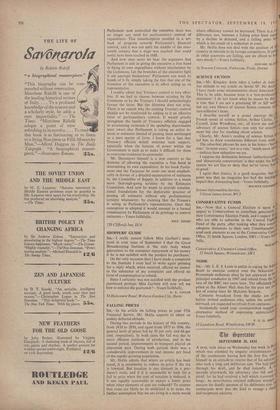FALLING PRICES
SLR,—In his article on falling prices in your 57th Financial Survey, Mr. Hollis appears to adopt an unduly defeatist attitude.
During two periods in the history of this country, from 1810 to 1850, and again from 1873 to 1896, the general level of prices fell by 50 per cent. and 60 per cent. respectively. In both cases the fall was due to more efficient methods of production; and in the second period, improvements in transport played an important part. During both periods there was a considerable improvement in real income per head of the rapidly growing population.
Mr. Hollis admits that where an article has been taxed, it is reasonable to reduce its price if the tax is lowered. But taxation is one element in a pro- ducer's costs, and if it is reasonable to look for a fall in price when the cost of taxation is reduced, is it not equally reasonable to expect a lower price when other elements of cost are reduced? To assume that costs are likely to be stabilised is to make the further assumption that we are living in a static world
where efficiency cannot be increased. There is a V difference, too, between a falling price level cat by a decline in demand, and a falling prite le which is the result of a reduction in costs.
Mr. Hollis does not deal with the position of country in relation to its foreign competitors. If pr in other countries are falling, can we afford to k
DDorsetW ARp










































 Previous page
Previous page